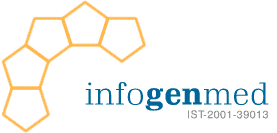

INFOGENMED aims at building a virtual laboratory for accessing and integration of genetic and medical information for health applications. Resorting to this integrated environment, clinicians are able to access and relate diseases data already available in the Internet, scattered along multiple databases. Two main issues are involved in this research project:
- The integration of heterogeneous medical and genetic databases over the Internet, using an innovative, robust approach
- The integration of medical and genetic terminologies in a vocabulary server
To achieve this goals, the project encompasses several major steps:
- Design of methods and development of tools for the integration of medical and genetic methods and tools
- Design and implementation of a friendly interface to support users on searching, finding and retrieving the contents of remote databases, based on a vocabulary server for the integration of medical and genetic terms and concepts
- Development of an «assistant» to help health practitioners to user the developed methods and tools
- Application and validation of the system in the area of rare genetic diseases
Expected Achievements
Some examples of the expected achievements of the project are:
- To facilitate the identification, access, integration and retrieval of genetic and medical information from heterogeneous sources over Internet
- To develop new contributions to the exchange and unification of medical and genetic terminologies, which can be stored in vocabulary servers. These servers can be queried over Internet to aid in information exchange between different information systems
- Enable further collaboration between two important groups of professionals: bioinformaticians and medical informaticians
- To prove the feasibility of the INFOGENMED project in the domain of rare genetic diseases, facilitating the work of medical practitioners in the area
- Enhancing progress of molecular medicine and other health disciplines:
- As long as this genetic information can be added to medical records, these systems will become invaluable sources for population studies of genetic epidemiology
- Genetic information in health will form the basis of long-term preventive recommendations and treatments
- As our understanding of the genetic bases of drug action increases, physicians will be able to tailor their treatments and prescriptions to the peculiar genetics of their patients
